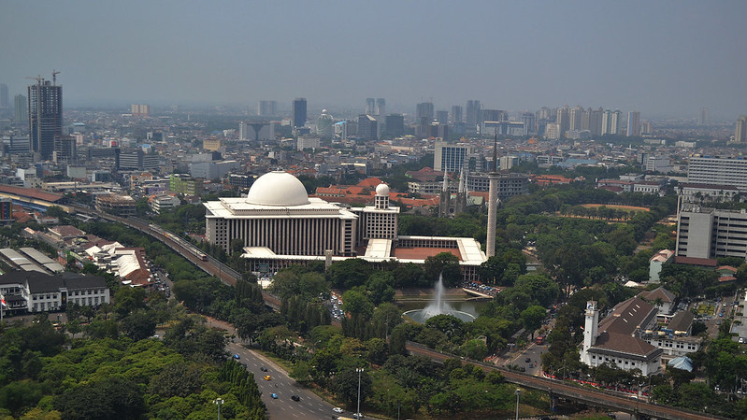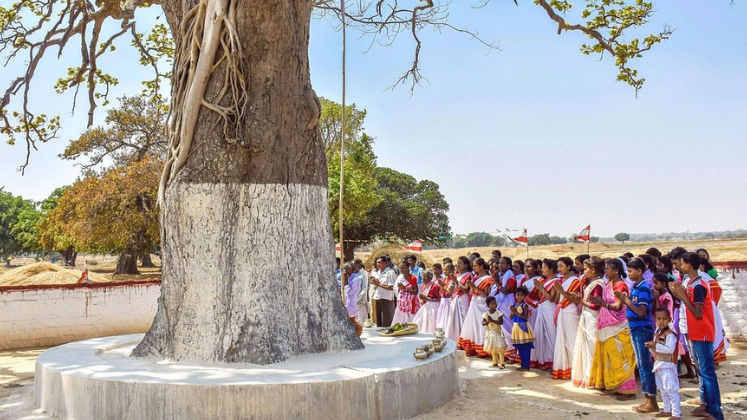Next week we’ll see presidential and parliamentary elections in the world’s largest Muslim nation. In this article, Chris Chaplin and Syarifuddin Jurdi analyse the evolving role of Islamic identities and religious rhetoric in political and community campaigns in Indonesia.

This month, Indonesians will head to the polls for the fifth consecutive presidential and sixth consecutive parliamentary elections. These elections are a significant attribute to the staying power of democratic practise within the world’s largest Muslim nation. But while free and fair elections have become a staple, a pivotal issue that has influenced recent Indonesian elections relates to the question of how Islamic identity should inform who can hold political office and how public spaces should be regulated. Somewhat comparable to the world’s two other largest democracies – the US and India (who are also going to the polls this year) – Indonesia has experienced a rise of majoritarian sentiment which mixes populist sloganeering and identity politics to foreground the rights and beliefs of the religious majority.
But whereas Christian supremacism and Hindu nationalism are likely to influence elections in the US and India, Indonesian politicians have – at least publicly – distanced themselves from such divisive religious rhetoric. This absence is even more significant given that two of the three presidential candidates, Prabowo Subianto and Anies Baswedan, were key enablers behind Muslim majoritarian sentiment. Within previous elections, both had formed a loose coalition with socio-conservative Islamic scholars to tarnish their electoral opponents as either deviant Muslims or blasphemers of the Quran. Although not always successful, this majoritarianism was as potent as it was contentious, bringing close to a million Muslim demonstrators to the streets of Jakarta in 2016.
Pushing Majoritarianism to the Political Fringes
The lack of overt religious mobilisation doesn’t imply religion is no longer important. For sure, there is no singular ‘Muslim’ vote or Islamic platform to speak of, and so majoritarianism does not appeal to all Indonesian Muslims. Indonesia’s two largest Islamic organisations, Nahdlatul Ulama and Muhammadiyah, never condoned such overt Islamic mobilisation. But polling shows that religious affiliations and identities continue to inform how a lot of Indonesians vote, as does the inter-religious distrust that fuels majoritarianism. Politicians are aware that houses of worship, religious networks, and online scholars continue to play a vital role in disseminating information.
Neither does the diminished use of sectarian rhetoric mean that the Islamic networks behind majoritarianism have gone away. The mix of Salafi-inspired scholars like Bachtiar Nasir and Muhammad Zaitun Rasmin, conservative online preachers like Abdul Somad, and Islamic vigilante organisations such as the Islamic Defenders Front, all of whom advocate for majoritarianism, continue to operate. But what has changed has been the nature through which politicians engage with Islamic actors.
Religion has been pushed to the margins of political debate, and one reason behind this marginalisation is the strength of elite-based patronage politics. As Berenschot and Aspinall have argued, Indonesia’s democracy is a ‘freewheeling clientelist political system’, and this means that transactional coalition building takes priority over detailed programmatic or ideological platforms. Elite level horse trading has only increased in 2024.
Presidential candidates may still make overtures towards Islamic scholars, but no candidate is willing to overtly condone majoritarian-based identity politics for fear of isolating the coalition partners. This is most evident within the campaign of frontrunner Prabowo Subianto. Prabowo’s 2014 and 2019 presidential campaigns painted his then rival, current president Jokowi, as the anti-Islam candidate. In 2024 however, he has little need for them, instead allying himself to the leadership of the traditionalist Nahdlatul Ulama. This is because Prabowo has re-positioned himself as Jokowi’s ‘legacy’ candidate, even taking on the president’s son, Gibran Rakabuming, as his running mate. His overtures towards Nahdlatul Ulama are a continuation of Jokowi’s own relationship with the organisation, and Prabowo hopes their backing will increase his vote in the Nahdlatul Ulama strongholds of Central and Eastern Java.
Prabowo’s turn away from conservative Islamic sentiment means that his opponent Anies Baswedan has become the ‘Islamic’ nominee of the three presidential candidates. Indeed, Anies is supported by notable Islamic political parties such as the Justice and Welfare Party (PKS), and National Awakening Party (PKB). He has also received support from notable preachers once affiliated to majoritarian campaigns including Abdul Somad, Adi Hadiayat, and the former head of the vigilante Islamic Defenders Front, Rizieq Shihab.
Yet despite signing up to a vague agreement to combat ‘secularism’, Anies’ overtures towards his Islamist allies are little more than performative. Like Prabowo, his campaign is predominantly driven by a need to balance internal differences within his own political coalition and appeal to as many Indonesians as possible. This is not easy. Although both the PKB and PKS appeal to Indonesian Muslims, their approaches to Islamic jurisprudence and politics are starkly different. PKB consider the PKS’ Muslim Brotherhood roots controversial, and prominent PKB leaders consider the PKS as ‘Wahabis’ with little sensitivity to Indonesia’s own Islamic traditions.
Repression and Shifting Goals
It is not just the political landscape that has changed though, majoritarian actors themselves have also evolved. President Jokowi’s administration has become increasingly intolerant towards dissent. Environmental campaigners, labour activists, and human rights defenders have all faced increased harassment during his second presidential term. But this repression has arguably hit Jokowi’s Islamic opponents hardest. Beginning in 2017, his government embarked on an anti-Islamist policy that Greg Fealy referred to as ‘repressive pluralism’. The suppression of Islamic conservatism was justified on the grounds that the government had a duty to defend the pluralistic nature of Indonesia’s religious character.
Yet security forces often use dubious regulations and means to do so. Adopting an expansive understanding of ‘radicalism’, Jokowi’s administration banned prominent Islamic groups such as Hizb ut-Tahrir Indonesia and the Islamic Defenders Front, while charging numerous religious scholars with criminal charges. Notably this includes prominent scholars behind Muslim majoritarianism such as Habib Rizieq Shihab, who was sentenced to an 8-month jail sentence for violating Covid-19 regulations in a case widely seen as politically motivated.
As it has become riskier to organise, many socio-conservative Islamic scholars have altered how they engage with politics. Since 2017, those affiliated with Salafi and Muslim Brotherhood networks have shunned mass mobilisation, preferring to advocate through government lobbying and legal process. The Love Family Alliance (ALIA) was one such example, as it aimed to promote an ‘Islamic’ understanding of the family by advocating for the criminalisation of same-sex and extramarital relations. As Nava Nuraniyah explains, such pragmatism has since spread more widely across the majoritarian movement. Even the most outspoken ideologues such as Habib Rizieq Shihab have dampened their talk of religious division, advocating instead for the restoration of civic freedoms and ‘religious expression’.
Unbound Majoritarianism?
The implication is that while Indonesia’s current elections may not be dominated by Islamic symbolism, religion not only remains important but majoritarianism has not disappeared. For sure, when compared to the US or India, Indonesia is having greater success in stemming the tide of sectarian politics. But unlike the US or India, Indonesia’s majoritarianism is more versatile, neither attached to a particular politician, ideology, or party. It is unbound, and while this may mean that it flourishes only when political interests and conservative Islamic scholars find common ground, it also speaks to its adaptability and pragmatism. Despite government repression, socio-conservative scholars continue to dominate Indonesia’s religious social media sphere, and the networks that made majoritarianism so potent remain. Together, they will likely outlast any single election.
Photo by Victor Ulijn





